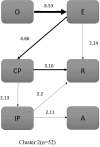Technology-driven initiating actions influence movement patterns in HMEAYC musical activities
- PMID: 40604102
- PMCID: PMC12222461
- DOI: 10.1038/s41598-025-09177-7
Technology-driven initiating actions influence movement patterns in HMEAYC musical activities
Abstract
This study examines the integration of technology into the Holistic Music Educational Approach for Young Children (HMEAYC) by analyzing children's movement sequences during musical rhythm activities. Specifically, it investigates the effects of technology-enhanced music on children's initiating actions and movement patterns, comparing those with prior music experience to those without. A total of 75 children (43 boys and 32 girls), aged 3-6 years and enrolled in central Taiwan kindergartens, participated in the study. They were categorized into two clusters: Cluster 1 (n = 23) with minimal prior music exposure and Cluster 2 (n = 52) with previous musical experience. Researchers analyzed over 10 h of video recordings using a coding scheme that classified behaviors into six categories: Observation, Execution, Correct Performance, Abandonment, and Restart. Sequential behavior analysis revealed that children in Cluster 2 demonstrated significantly higher adaptability and reflective learning, showing more effective transitions, particularly from Observation to Execution and from Execution to Correct Performance. In contrast, Cluster 1 children exhibited limited behavioral flexibility, frequently repeating actions without evident improvements. Individual Performance (IP) did not manifest a statistically significant disparity among the clusters; nevertheless, a trend-level variation was detected. This indicates a plausible differentiation in children's independent rhythmic execution, which necessitates additional inquiry. These findings suggest that technology-integrated HMEAYC enhances young learners' engagement and adaptability. Future studies should explore targeted interventions to support children with minimal musical experience and conduct longitudinal research to assess the long-term cognitive and social impacts of technology-enhanced music education.
Keywords: Holistic Music Educational Approach for Young Children (HMEAYC); Movement patterns; Musical rhythm; Preschoolers; Technology integration.
© 2025. The Author(s).
Conflict of interest statement
Declarations. Competing interests: The authors declare no competing interests. The first author, L.L. and corresponding author, H.J.H., affirms that this statement is made on behalf of all authors.
Figures
References
-
- Esimone, C. C. & Ojukwu, E. V. Music in early childhood education: Its importance in selected child development. J. Educ. Social Res.4(1), 39. 10.5901/JESR.2014.V4N1P39 (2014). - DOI
-
- Mangwaya, E. Music, learning and early childhood education: A review of literature. J. Stud. Social Sci. 14(1). http://ir.msu.ac.zw:8080/xmlui/handle/11408/1815 (2016).
-
- Lave, J. & Wenger, E. Learning in doing: Social, cognitive, and computational perspectives. Situated Learning Legitimate Peripheral Participation10, 109–155 (1991).
-
- Duncombe, R., & Preedy, P. (2018). Movement for learning. in Early Childhood Education Redefined (pp. 48–60). 10.4324/9781351213660-4 (2018).
-
- Kelly, M. (2012) Notable notes for parents & teachers: Music & movement: The fun way to develop self-regulation. Perspectives J. Early Childhood Music Movement Assoc. 7(1), 1–1. 10.1386/IJMEC_0196_7.
MeSH terms
LinkOut - more resources
Full Text Sources




